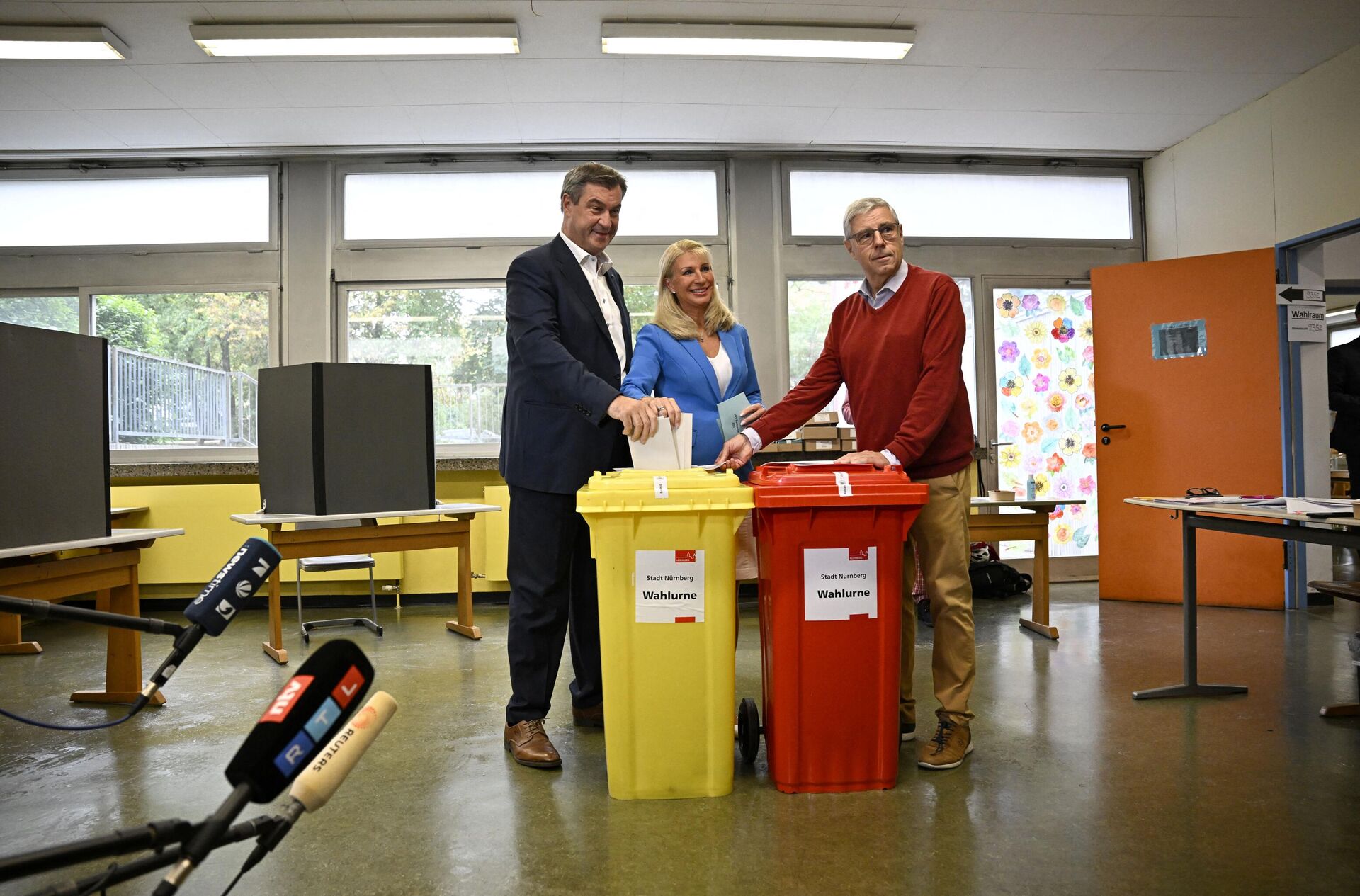https://sputnikglobe.com/20231008/dissatisfaction-to-dominate-german-regional-elections-amid-scholzs-fading-popularity--1114019397.html
Dissatisfaction to Dominate German Regional Elections Amid Scholz's Fading Popularity
Dissatisfaction to Dominate German Regional Elections Amid Scholz's Fading Popularity
Sputnik International
Recent polls revealed that about half of the German electorate is dissatisfied with the federal government, something that is expected to affect voters’ choice in the state of Hesse.
2023-10-08T14:47+0000
2023-10-08T14:47+0000
2023-10-08T14:47+0000
world
germany
bavaria
hesse
elections
voters
ballots
polls
https://cdn1.img.sputnikglobe.com/img/07e7/0a/08/1114018523_0:110:3249:1937_1920x0_80_0_0_1393652993fbbaa5fb4bbef3df33b1d6.jpg
Residents of Bavaria and Hesse cast ballots in state elections on Sunday, votes that are seen as "a barometer for the entire country's mood," a German newspaper has reported.Markus Soder, the leader of the conservative Christian Social Union (CSU) party, is expected to maintain his position as Bavarian state premier.Even so, polls indicate that the CSU, which has ruled in the southern state of Bavaria since 1957, will most likely obtain just 37% of the vote, which would be the party’s lowest result in decades. In Hesse, German Interior Minister Nancy Faeser is running as the lead candidate of the center-left Social Democrats (SPD), with polls suggesting that she will hardly get the better of current premier Boris Rhein of the conservative Christian Democratic Union (CDU).The CDU is currently polling at 32%, followed by the SPD and Greens. In any case, the CDU’s performance in Hesse is all but sure to improve, given that the party gained a total of 27% votes in the 2018 state elections.The far right Alternative for Germany (AfD) is projected to increase its numbers in the Sunday elections, even though the party is not expected to enter government in either state. The AfD is currently polling at 14% in Bavaria and 16% in Hesse.Political scientist Karl-Rudolf Korte has, meanwhile, told a German newspaper that the three national governing parties, including the Social Democrats, the Greens and the liberal Free Democrats (FDP), will perform poorly in the Sunday votes because people “aren’t confident in their being able to solve the problems in the country.”The FDP and its party chief, Finance Minister Christian Lindner, are expected to be the main outsiders in the vote. In Hesse, the party is polling at about 5%, while in Bavaria, they may only obtain 3% — below the required 5% threshold to enter parliament.
germany
bavaria
hesse
Sputnik International
feedback@sputniknews.com
+74956456601
MIA „Rossiya Segodnya“
2023
Oleg Burunov
https://cdn1.img.sputnikglobe.com/img/07e4/09/0b/1080424846_0:0:2048:2048_100x100_80_0_0_3d7b461f8a98586fa3fe739930816aea.jpg
Oleg Burunov
https://cdn1.img.sputnikglobe.com/img/07e4/09/0b/1080424846_0:0:2048:2048_100x100_80_0_0_3d7b461f8a98586fa3fe739930816aea.jpg
News
en_EN
Sputnik International
feedback@sputniknews.com
+74956456601
MIA „Rossiya Segodnya“
Sputnik International
feedback@sputniknews.com
+74956456601
MIA „Rossiya Segodnya“
Oleg Burunov
https://cdn1.img.sputnikglobe.com/img/07e4/09/0b/1080424846_0:0:2048:2048_100x100_80_0_0_3d7b461f8a98586fa3fe739930816aea.jpg
state elections in bavaria and hesse, government of chancellor olaf scholz, german electrorate, residents of bavaria and hesse
state elections in bavaria and hesse, government of chancellor olaf scholz, german electrorate, residents of bavaria and hesse
Dissatisfaction to Dominate German Regional Elections Amid Scholz's Fading Popularity
Recent polls revealed that about half of the German electorate is dissatisfied with the federal government, something that is expected to affect voters' choice in the states.
Residents of Bavaria and Hesse cast ballots in state elections on Sunday, votes that are seen as "a barometer for the entire country's mood," a German newspaper has reported.
Markus Soder, the leader of the conservative Christian Social Union (CSU) party, is expected to maintain his position as Bavarian state premier.
Even so, polls indicate that the CSU, which has ruled in the southern state of Bavaria since 1957, will most likely obtain just 37% of the vote, which would be the party’s lowest result in decades.
In Hesse, German Interior Minister Nancy Faeser is running as the lead candidate of the center-left Social Democrats (SPD), with polls suggesting that she will hardly get the better of current premier Boris Rhein of the conservative Christian Democratic Union (CDU).
The CDU is currently polling at 32%, followed by the SPD and Greens. In any case, the CDU’s performance in Hesse is all but sure to improve, given that the party gained a total of 27% votes in the 2018 state elections.
The far right
Alternative for Germany (AfD) is projected to increase its numbers in the Sunday elections, even though the party is not expected to enter government in either state. The AfD is currently polling at
14% in Bavaria and
16% in Hesse.
Political scientist Karl-Rudolf Korte has, meanwhile, told a German newspaper that the three national governing parties, including the Social Democrats, the Greens and the liberal Free Democrats (FDP), will perform poorly in the Sunday votes because people “aren’t confident in their being able to solve the problems in the country.”
“That has to do with the variety of crises, but also with the communication. The situation would be different if the [coalition] partners would explain better what they are doing and why, if they would act more closely together,” Korte added.
The FDP and its party chief, Finance Minister Christian Lindner, are expected to be the main outsiders in the vote. In Hesse, the party is polling at about 5%, while in Bavaria, they may only obtain 3% — below the required 5% threshold to enter parliament.
About 9.4 million people are eligible to vote in Bavaria and nearly 4.3 million in neighboring Hesse, home to Germany’s financial capital Frankfurt. Both states are led by the country’s main opposition union bloc of the CDU and CSU.
German media described the Sunday votes as something that could send a clear message to the government of Chancellor Olaf Scholz, who has repeatedly been slammed over his policy to resolve pressing issues related to inflation, immigration and economic issues.




